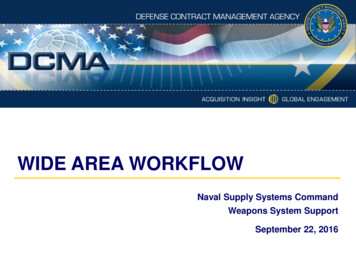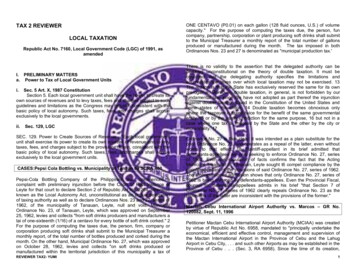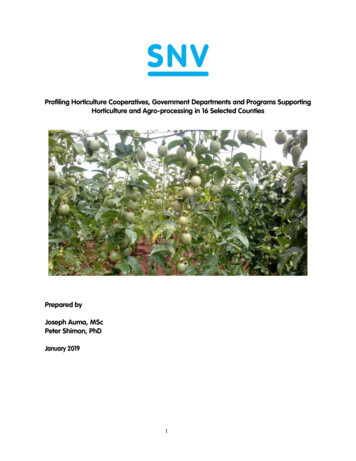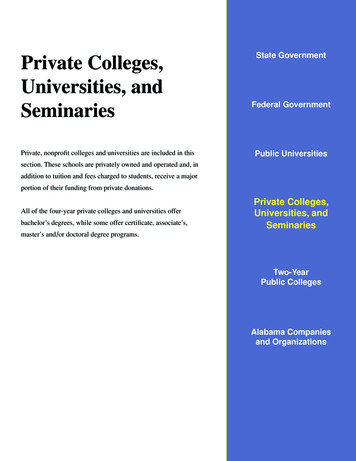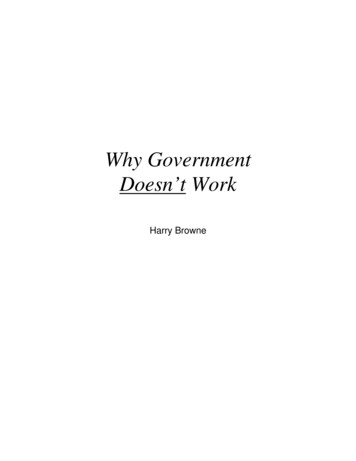
Transcription
Why GovernmentDoesn’t WorkHarry Browne
WHY GOVERNMENT DOESN’T WORK. 1995, 2003 by Harry Browne.All rights reserved.Printed in the United States of America.No part of this book may be used or reproduced in any manner whatsoeverwithout written permission, except in the case of brief quotations embodied incritical articles or reviews.For information, contact HarryBrowne@HarryBrowne.org.ISBN 0-312-13623-4First edition: December 1995Second edition: November 2003ii
to Pamelaiii
Also by Harry BrowneHow You Can Profit from the Coming Devaluation (1970)How I Found Freedom in an Unfree World (1973, 1998)You Can Profit from a Monetary Crisis (1974)The Complete Guide to Swiss Banks (1976)New Profits from the Monetary Crisis (1978)Inflation-Proofing Your Investments (with Terry Coxon, 1981)Investment Rule #1 (1985)Why the Best-Laid Investment Plans Usually Go Wrong (1987)The Economic Time Bomb (1989)Fail-Safe Investing (1995, 2003)The Great Libertarian Offer (2000)iv
ContentsForeward to 2003 Edition . viiPrologue1The Breakdown of Government .2Part I — Why Government Doesn’t Work23456789101112What Is Government? .Oops! Why Government Programs Always Go Astray .Why Government Grows & Grows & Grows .If You Were King (The Dictator Syndrome) .How Did We Get in this Mess? .Government Doesn’t Work .Once the Land of the Free .How Freedom Was Lost .How Much Freedom Is Left? .Your Innocence Is No Protection .On the Road to a Better World .913171927323538485466Part II — Solving Today’s Social & Political Problems131415161718192021222324252627Fixing America’s Problems . 71Why Freedom Brings Prosperity . 75How Your Life Is Regulated . 80Health Care — The Problem . 92Health Care — The Solution . 101Improving Education . 112The Welfare Mess . 119Fighting Crime or Playing Games? . 129A Weak National Defense . 141An Effective National Defense . 149Do We Really Want Government to Determine Family Values? . 164How to Fix Social Security Once and for All . 170A Freedom Budget . 181Neither of the Two Old Parties Will Save Us . 198What the President Can Do . 206v
Epilogue28A Message of Hope . 213AppendicesA.B.C.D.Acknowledgments . 221Further Exploration . 222The Author . 230A Message from Pamela Browne . 231vi
Foreward to 2003 EditionThis book was originally published in 1995 as the campaign book for my1996 presidential campaign as the candidate of the Libertarian Party.This 2003 edition has been revised slightly to eliminate references to mypresidential campaign, to eliminate passages that pertained only to the world of1995, and to make a few points a bit clearer. However, I have not attempted tobring statistics, tables, or graphs up to date.Although new laws and policies of the past eight years have causedgovernment to grow larger and more intrusive, nothing has happened to alter theprinciples or assertions made in the original version. And, as the original versionhas gone out of print, I didn’t want to delay the republication of the book byspending several months finding newer examples or statistics. The principles aretimeless, and they are what matters.Please note that, because I was running for President in 1995, the primaryfocus in this book is on the federal government, with very little about theproblems posed by state and local governments.vii
Prologue1
1The Breakdown of GovernmentImagine living in a city where you felt safe walking home at ten in theevening — or even at two in the morning.Imagine your children going to schools that respect your values; whereteachers concentrate on reading, writing, adding, subtracting, and other academicbasics; and where no one would dare teach your child a philosophy that’s alien toyou.Imagine that your total tax load — income tax, sales tax, property tax andother taxes — was only half what you’re paying now. You could move into abetter home, finance a more comfortable retirement, send your children to theprivate school of your choice, support your favorite cause or charity in a way thatwould make a significant difference, or save up to go into business for yourself.With much lower taxes, your family could live well on the income of justone spouse — so the other parent could choose to stay home and raise yourchildren in the values you believe, rather than leaving their moral training tostrangers.Is This a Dream?I’m not describing Utopia. A free society wouldn’t be perfect. But asrecently as 1950, it was real. The crime rate was only one fifth of what it istoday. 1Most American school children learned to read, write, and do mathcompetently — and they left school able to make their way in the world.Government was only one fifth the size it is today.1Calculatedfrom data in the FBI report Urban Crime Reports: Crime in the UnitedStates 1991 (1992), reported in The Universal Almanac 1994 (page 239), andHistorical Statistics of the United States, Colonial Times to 1970, table H952-961(page 413).2
The Breakdown of Government3Government Running WildBut today’s America is quite different. It is a land where crime is a nationalscandal, schools turn out illiterates, and taxes drive both parents into the jobmarket. The “American dream” has become a mirage for too many of us.And to make matters worse, government has grown too large and too bold.It routinely tramples on our property and our liberties: The federal government was founded by men who warned“Don’t tread on me.” But that government now pries into yourbank account, threatens to destroy you to collect its taxes, andtries to herd you into a health-care collective — as though youwere a Soviet citizen. Federal, state, and local governments together take 47% of yourearnings through direct and hidden taxes — cutting yourstandard of living to a fraction of what it could be. The government created to enable us to pursue happiness inpeace now runs up the price of everything you buy through theregulations and mandates it lays on companies. The government set up to protect private property nowconfiscates it in the name of fighting drugs or preserving theenvironment. The courts that once defended your privacy and liberties nowratify any intrusion that can be shown to be in the government’sinterest.This is a far cry from what the founding fathers had in mind — agovernment instituted among men to secure the blessings of life, liberty, andproperty.What Changed?No plague descended upon America to halt progress and plunge us into aworld of violent crime, poor education, and big government.So how did it happen? What transformed America from the land of the freeinto the land of high taxes — from the land of prosperity into the land of debtand bankruptcy — from the land of opportunity to the land of quotas andlawsuits — from the land of free enterprise to the land of regulations, mandates,and government inspectors?The decline of America has been caused by politicians and reformers whobelieve that you aren’t competent to run your own life, that they know better how
4Harry Browne / Why Government Doesn’t Workto spend the money you’ve earned, that they understand which products youshould be allowed to buy and what wages and job benefits are suitable for you.To run your life for you, they have created a government that fails ateverything it undertakes, but wants to undertake everything: The government can’t deliver the mail on time, but wants totake your life in its hands by controlling your health care. The government can’t keep the peace in Washington, D.C., butit sends troops on “peacekeeping missions” to Somalia andHaiti — to save those countries from being run by the wrongthugs. Government schools don’t have the money and time to teachyour children how to read well — yet they always find theresources to teach their favorite social theories, no matter howdistressing they are to parents.Wherever we look, government fails at what we want, and succeeds only infinding new ways to interfere with our lives.What Went Wrong?Once upon a time government budgets were balanced, our money wassound, the cities were safe, and the taxes of federal, state, and local governmentscombined took less than 10% of our income.2The graph on the next page shows how the cost of government has grown.But no graph can show how government has intruded deeper and deeper into ourlives, making decisions we used to make for ourselves. Government decideswhich products we’re allowed to buy, sets wage floors that force unemploymenton teenagers, prevents most small businesses from raising capital, and stops thecritically ill from using life-saving medicines while bureaucrats pretend toprotect us.2Thetax data is from the U.S. Bureau of the Census series “All Governments —Summary of Finances,” which is published in Historical Statistics of the UnitedStates, Colonial Times to 1970, Series Y-505, page 1119, and in various annualissues of The Statistical Abstract. This series eliminates all duplication among levelsof government. The national income data are taken from Economic Indicators 1980Historical Supplement (Joint Economic Committee of Congress), and from HistoricalStatistics of the United States, Colonial Times to 1970, Series F-7, page 224.
The Breakdown of Government5% of our Income% of our Income100%100%GOVERNMENT TAKESMORE & MORE OF OUR INCOMEThe percentage of total U.S. income takenby combined federal, state, & localgovernment taxes. In 1902 governmenttook only 8% of our income; in 1997government took 48%.90%80%70%90%80%70%Source: U.S. Census Bureau statistics.60%60%50%50%World War II40%40%30%30%World War 0s1970s1980s1990sWhere did it all go wrong? Wasn’t government supposed to be our servant,rather than our master? Wasn’t government supposed to help only those whocan’t help themselves — rather than benefiting politicians, lobbyists, and socialreformers?What happened to the idea that government should do for the people onlywhat they cannot do for themselves?WHAT WE WILL COVERWe need to answer those questions before we can revive the Americandream of liberty and prosperity for all.Understand the ProblemBut to understand how government went so wrong, we must first identifyexactly what government is and how it operates. Because Part I does this, it maybe the most important section of the book.It shows why government programs never seem to produce the results thatwere promised — why laws to make America “color blind” lead to racial quotas,
6Harry Browne / Why Government Doesn’t Workwhy programs to improve the economy end in recession and inflation, and whyplans to help the poor enlarge their numbers.Identify the SolutionsPart II examines specific issues — showing how government created theproblems the politicians now pretend they can solve, and showing how we cansolve these problems. We will see: How crime, education, and welfare went from minor problemsin the 1950s to major scandals in the 1990s — and how we canend the scandals. How to fix Social Security once and for all — to end its periodiccrises, and to guarantee that you get everything you pay for. How to balance the federal budget immediately and permanently— without raising taxes. How to keep government from running up the prices of thethings you buy and reducing the wages you earn. How America can be much safer from foreign attack with amuch smaller military budget. How to cut taxes to a fraction of where they are now. . . and much more.Today’s social and political problems aren’t mysterious punishmentsinflicted by angry gods. They are man-made, and they can be fixed. If weunderstand what caused them, we can cure them. And we can make sure theydon’t recur.Getting from Here to TherePart II shows how we can get from where we are now to where we want tobe — to a society where crime rates are low, education is first-class, taxes aretrivial, products and services are plentiful and inexpensive, jobs are morerewarding, and each of us is free to make of his life what he will.It has come to seem impossible that we could ever cut government andreduce taxes enough to make a real difference in our lives. We’re told thateveryone wants a smaller government but that no one wants to give up his ownfavorite program. Part II will show how we can escape that trap.
The Breakdown of Government7IT’S UP TO USA revolution is sweeping through America today — as Americans havegrown impatient with big government, high taxes, meddling politicians andbureaucrats, soaring crime rates, and mediocre education.If the revolution brings the right changes, America can be free, peaceful, andprosperous again.But to restore that free country, we first need to understand how we arrivedwhere we are today.So let’s get started.
Part IWhy Government Doesn’t Work8
2What Is Government?To understand how government went wrong, we must understand what it is.Government dominates our lives; it is at the center of most news and mostpublic discussion. And yet not one person in a hundred can explain what wemean by “government,” and no school or textbook bothers to provide a precisedefinition.What is government? What makes it different from IBM or the Boy Scoutsor a local security company? What is there about government that enables it to dowhat other organizations can’t?When a reformer decides that everyone should have health insurance or thatevery worker should have “family leave,” why doesn’t he take his project to theRed Cross or the Chamber of Commerce? Why does he turn to government?What makes government different from every other institution in society?Is it that only government is large enough to handle some tasks?No. General Motors alone had revenues of 132 billion in 1992. And in1995 Pacific Bell announced that it would raise 16 billion to rewire the entirestate of California to accommodate the information “superhighway.” Even largercompanies than these could be organized if they were needed.3Is it that only government operates without profit?No — so do the Salvation Army, the Rotary Club, and thousands of otherorganizations.Is it that government cares more about the future than private companiesdo?Hardly. A corporation may last for centuries. Its management enhancestoday’s stock price by building tomorrow’s earnings, because almost anyinvestor will prefer a stock that’s likely to pay dividends for 50 years over a stockwhose dividends may end in 10 years. But politicians have little interest inanything beyond the next election.3TheGeneral Motors revenues are from The World Almanac and Book of Facts, 1994,page 112. The Pacific Bell announcement appeared in the San Francisco Examiner,November 11, 1993, page A-1.9
10Harry Browne / Why Government Doesn’t WorkIs it that government is the only institution that considers the well-being ofall citizens?No institution can do that — and certainly not government. Anythinggovernment gives to one group must be taken from others. So governmentnecessarily plays favorites, which divides people into opposing camps.Government’s Unique AssetWhat separates government from the rest of society isn’t its size, itsdisregard for profit, its foresight, or its scope.The distinctive feature of government is coercion — the use of force and thethreat of force to win obedience. This is how government differs from everyother agency in society. The others persuade; government compels.When someone demands that government help flood victims, he is saying hewants to force people to pay for flood relief. Otherwise, he’d be happy to havethe Red Cross and its supporters handle everything.When someone wants government to limit the price of a product, he isasking to use force to prevent people from paying more for something they want.Otherwise, he would simply urge people not to patronize those he thinks arecharging too much.When Congress passes a bill mandating “family leave,” it forces everycompany to provide time off for family problems — even if its employees wantthe employer to use payroll money for some other benefit. Otherwise, employersand employees would be free to decide what works best in each situation.Nothing involving government is voluntary — as it would be when a privatecompany does something. One way or another, there is compulsion in everygovernment activity: The government forces someone to pay for something; The government forces someone to do something; or The government forcibly prevents someone from doingsomething.There is no other reason to involve government.And by “force” I mean the real thing — the kind that hurts people.As Long as You Comply . . .In some government agencies, such as the police and prisons, the role ofcoercion is obvious. But it is at work in every government program — although aprogram’s supporters rarely acknowledge it.
What Is Government?11If this seems like too sweeping a statement, it may be that you’ve never triedto resist a government program. If you did, you’d have learned very quickly thatthe program is enforced by a gun. The easiest way to spot the gun is to imaginewhat would happen if you decided to ignore the government’s “request.”Suppose, for example, that you’re a barber. One day the state Board ofTonsorial Cutters of Hair (BOTCH) issues a regulation to stop “cut-throatcompetition” — decreeing that no barber can charge less than 8 for a haircut.(Many states do have laws prohibiting barbers from charging less than a statedminimum price.)So long as you charge at least 8, you won’t even notice the regulation. Butsuppose your price is only 6. Perhaps you’re in a low-income neighborhoodwhere people can’t afford 8 haircuts, or maybe your shop is new and you wantto attract customers, or perhaps business is slow and you need to stimulate sales.For whatever reason, suppose you offer haircuts for 6.You may be able to get away with this for a month or two. But eventuallythe folks at BOTCH will send you a letter, ordering you to desist.If you comply by boosting your price to 8, you’ll hear nothing more. But ifyou keep cutting hair for 6, eventually some men in suits will come to yourshop and warn you to stop undercharging.If you continue to ignore the law, you’ll receive a subpoena — telling you toappear in court. If you don’t show up, or if you ignore the court’s order to raiseyour price, your barber’s license will be revoked.If you defy the court by continuing to cut hair, another group of men willcome to your shop. These fellows may not be in suits, and they probably willhave guns. They will be there to close your business.If you resist, their job will be to “take you into custody” — which is aeuphemism for seizing you, handcuffing you, and taking you to jail against yourwill.At this point, it will be obvious that the regulation’s purpose is to forcebarbers to charge at least 8 — not by persuasion, but with a gun.Every government program, no matter how benign it may appear, isthe same. Coercion is the reason — and the only reason — it is agovernment program.Voluntary vs. CompulsoryThe IRS likes to say that our tax system is based on voluntary compliance.And in a sense, that’s true: so long as you comply, the system seems to bevoluntary. But the moment you choose not to comply, you’ll find yourself in adifferent system — one where you’ll be forced to pay.
12Harry Browne / Why Government Doesn’t WorkPeople seek the help of business groups, charity organizations, and serviceclubs to urge others to support some cause. People turn to government to forceothers to support their cause.Now, you may believe that government should set prices for haircuts andother things — or that it should force people to do what’s good for them orwhat’s good for society. But those are other issues. Before we can address them,we first need to recognize the simple truth that every government program andregulation is backed by the same kind of force that is so useful for robbing7-Eleven stores. Only then will we understand why government programs turnout as they do and how government has come to where it is today.Think through any government activity. Eventually, you’ll find the coercionthat keeps it from being anything but a government program.Government DefinedSo what is government? Very simply, it is an agency of coercion.Of course, there are other agencies of coercion — such as the Mafia. So tobe more precise, government is the agency of coercion that has flags in front ofits offices.Or, to put it another way, government is society’s dominant producer ofcoercion. The Mafia and independent bandits are merely fringe competitors —seeking to take advantage of the niches and nooks neglected by the government.
3Oops!Why Government Programs Always Go AstrayBeing able to force people to do what you want can be an attractive prospect— especially if you don’t have to admit, even to yourself, how you’re gettingwhat you want. If you want to feed the homeless, you don’t have to persuadehundreds of people to donate money. The government can forcemillions of people to contribute. If your business is losing customers, you don’t have to try harderto match your competition. The government can establishlicensing laws or impose tariffs that get the competition out ofyour hair. If you don’t want people reading pornography or other “bad”literature, you don’t have to persuade them to find somethingbetter. Just get the government to drive the smut-peddlers out ofbusiness.Government, with its power to coerce, seems to be a magic wand that canmake your dreams come true. It can seem able to summon up anything you want,do away with anything you don’t like, and make everyone happy — especiallyyou.Because of government’s power, controlling it is the grand prize — thebrass ring, the pot of gold, the genie of the lamp. It beckons as the shortcut toriches, to the perfect world you imagine, to imposing your personal tastes oneveryone. With government at your disposal, it appears that you can bypass thetedious process of earning a living, spreading the gospel, or persuading othersthat you’re right.No wonder that most TV news revolves around government. No wondernearly everyone wants to influence government. Whoever controls it controls usall.13
14Harry Browne / Why Government Doesn’t WorkTHE CONSEQUENCES OF COERCIONGovernment is a powerful tool. But it’s far easier to put it in motion than tocontrol it. When government is involved, nothing ever seems to work out asintended.Discussions about a new government program always focus on those who“need help” — the people who will benefit immediately. They may be theintended recipients of government checks, or employees whose pay will beboosted, or companies whose markets will be enhanced. This is the stuff of greatdreams.But the dreams — of instant riches or social reform — lead inevitably todisappointment, and sometimes to nightmares.The plans almost always ignore the inevitable complications: The people you want to help get past a difficult predicament willdecide it’s easier to continue receiving the help than to moveonward. The people you believe need help will be joined by people whowould rather receive help than give it. The people whose lives must be turned upside down for theprogram to succeed — those who must be coerced — will dowhatever they can to avoid complying. The people who are kept from doing whatever the reformersdon’t like will find something worse to do instead.For example, a program to serve meals to 1 million children who aren’tgetting nutritious lunches will need 6 million meals per day — because thechildren’s families will decide they need breakfast and supper as well, andbecause the parents of 1 million other children will see no reason to continuepaying for something others are getting for free.And that’s just to start with. Over time, the program will need 10 millionmeals a day, and then 20 million, as more people learn how to qualify.A government program goes astray as well because little forethought isgiven to the people who must be coerced. These are thinking, feeling humanbeings — just like you and me — and they have no more desire to have theirlives turned inside out than you do.If they must pay for the service, they will seek ways to avoid making fullpayment — meaning there will be less revenue available for the service thanexpected. Or if they are forced to do something, they will look for every possibleway to avoid doing it without getting into trouble. Or if they’re prohibited from
Oops! Why Government Programs Always Go Astray15doing something they want to do, they’ll use their creative energy to find ways tocontinue doing it without running afoul of the law.Trashing Medical CareMedicare provides a good example. It was created in 1965 to make it easierfor the elderly to get health care. But by reducing the patient’s out-of-pocketcosts, it increased the demand for doctors and hospitals. And it reduced thesupply of those services by requiring doctors and other medical personnel to usetheir time and attention handling paperwork and complying with regulations —and looking for ways to circumvent these things. So the price of medical carerose sharply as the demand soared and the supply diminished.As a result, the elderly now pay from their own pockets over twice as muchfor health care (after adjusting for inflation) than they did before Medicarebegan. And most older people now find it harder to get adequate medical service.Naturally, the government points to the higher costs and shortages as proof thatthe elderly would be lost without Medicare — and that government should beeven more deeply involved.4When Medicare was set up in 1965, the politicians projected its cost in 1990to be 3 billion — which is equivalent to 12 billion when adjusted for inflationto 1990 dollars. The actual cost in 1990 was 98 billion — eight times as much.5Upside-Down ResultsWhen people set up a program for themselves, most of them act as theyagreed to. But when a program is based on coercion, everyone involved changeshis behavior — and the outcome is far different from what was intended.Government programs promoted by well-intentioned citizens are almost alwaysderailed by unforeseen consequences:4In 1961 the average elderly family spent 1,589 per year on health care (in 1991dollars). In 1991 this had risen to 3,305 per year. This was reported in “The HealthCare Squeeze on Older Americans,” a study by the Families USA Foundation, usingdata from the Consumer Expenditure Survey of the U.S. Bureau of the Census.5The estimate of Medicare’s 1990 cost is recounted in “The Great Patriotic War” byGrover G. Norquist, The American Spectator, December 1993, page 70. It ismentioned also in “American Health Care Today” by Edward R. Annis, M.D.,National Review, health care supplement, date unknown, page 8. The actual cost of 98 billion is given in Economic Indicators (Joint Economic Committee of Congress),July 1995.
16Harry Browne / Why Government Doesn’t Work Poverty programs don’t reduce the number of poor people. Onthe contrary, they encourage more people to qualify as poor andget on the gravy train. Rules and regulations don’t reform society as expected. Peoplerespond by looking for ways around the rules they don’t like. The War on Drugs makes drugs more profitable — increasingthe incentive for drug-pushers to recruit new customers. The underground economy thrives as a means of earning moneywithout losing it to government — reducing the revenues thathad been expected to pay for government programs.Human action is often unpredictable. But you can count on governmentprograms always to produce results quite different from those promised by theirsponsors.You would think this would cause people to shun government as a way ofsolving problems. But just the opposite happens — as we’ll see.
4Why Government Grows & Grows & GrowsThe bad consequences of a government program usually don’t show upi
iv Also by Harry Browne How You Can Profit from the Coming Devaluation (1970) How I Found Freedom in an Unfree World (1973, 1998) You Can Profit from a Monetary Crisis (1974) The Complete Guide to Swiss Banks (1976) New Profits from the Monetary Crisis (1978) Inflation-Proofing Your Investments (with Te
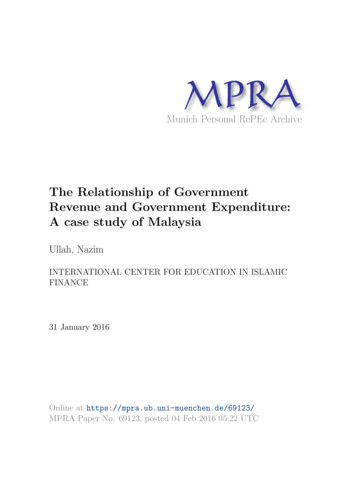

![[Page 1 – front cover] [Show cover CLEAN GET- AWAY 978-1 .](/img/13/9781984892973-6648.jpg)


